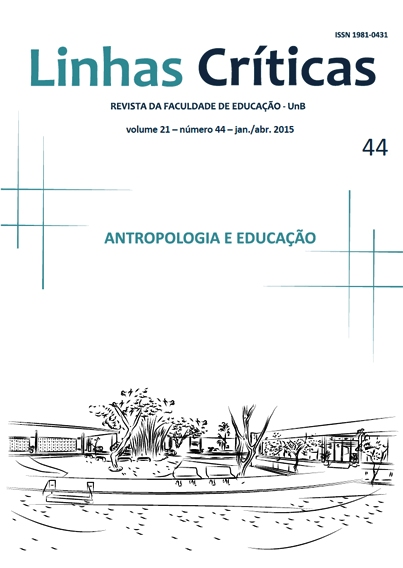Ethnography in educational research: training the scientific point of view
DOI:
https://doi.org/10.26512/lc.v21i44.4480Keywords:
Educational opportunities, Anthropological point of view, Educational point of view, Educational research, EthnographyAbstract
During 2011, we worked on research about the distribution of educational opportunities in the city of Rio de Janeiro. At first, the investigation was guided exclusively by sociological problems, and it was rebuilt methodologically when we proposed that all researchers involved in the application of questionnaires work in pairs and make ethnographic observations. This research was conducted in 51 residences in Rio de Janeiro. In this article, we will discuss the production of ethnographic narratives in educational research. Our foci are the particularities of the anthropological point of view and the specifics of the collective writing of ethnographical texts, traditionally an individual activity. We will describe the steps of the new methodology proposed and its main results: expanding the researchers’ capacity for relativizing, for understanding and valuing the natives’ point of view of the distribution of educational opportunities and for building an anthropological perspective of educational themes.
Downloads
References
BECKER, Howard. Segredos e truques da pesquisa. Rio de Janeiro: Zahar, 2007a.
BECKER, Howard. Writing for Social Scientists. How to start and finish your thesis, book, or article. Chicago: Chicago Press, 2007b.
BOURDIEU, Pierre; SAINT-MARTIN, Monique de. As categorias do juízo professoral. In: _______. Escritos de Educação. Petrópolis: Vozes, 1998.
BRANDAO, Zaia. Os jogos de escalas na sociologia da educação. Educ. Soc.2008, vol. 29, n. 103, pp. 607-620.
DURHAM, Eunice Ribeiro. A dinâmica da cultura: ensaios de antropologia. São Paulo: Cosac Naify, 2004.
CARDOSO DE OLIVEIRA, Roberto. O trabalho do antropólogo. Brasília: Editora Paralelo 15/Editora da Unesp, 1998.
DA MATTA, Roberto. Relativizando: uma introdução à Antropologia Social, Petrópolis Vozes, 1981.
DEBERT, Guita Grin. Formação e ensino. In: TRAJANO FILHO, Wilson; RIBEIRO, Gustavo Lins (Orgs.). O campo da antropologia no Brasil. Rio de Janeiro: Contra Capa/ABA, 2004.
DURHAN, Eunice. Ensino de antropologia. In: GROSSI, Mirian Pilar; TASSINARI, Antonella; RIAL, Carmem (Orgs.). Ensino de antropologia no Brasil. Blumenau: Nova Letra, 2006.
EVANS-PRITCHARD, Edward Evan. Bruxaria, oráculos e magia entre os Azande. Rio de Janeiro: Jorge Zahar Editor, 2004.
FONSECA, Claudia. Quando cada caso NÃO é um caso: pesquisa etnográfica e educação. Rev. Bras. Educ. 1999, n. 10, pp. 58-78.
FRY, Peter. Formação ou educação: os dilemas dos antropólogos perante a grade curricular. In: GROSSI, Mirian Pilar; TASSINARI, Antonella; RIAL, Carmem (Orgs.). Ensino de antropologia no Brasil. Blumenau: Nova Letra, 2006.
GEERTZ, Clifford. A interpretação das culturas. Rio de Janeiro: LTC, 1989.
GIUMBELLI, Emerson. Para além do “trabalho de campo”: reflexões supostamente malinowskianas. Rev. bras. Ci. Soc. vol. 17, n. 48, 2002.
GROISMAN, Alberto. Ensino de antropologia em “outros cursos”. In: GROSSI, Mirian Pilar; TASSINARI, Antonella; RIAL, Carmem (Orgs.). Ensino de antropologia no Brasil. Blumenau: Nova Letra, 2006.
GROSSI, Miriam Pilar. Os egressos dos programas de pós-graduação em antropologia. In: TRAJANO FILHO, Wilson; RIBEIRO, Gustavo Lins (Orgs.). O campo da antropologia no Brasil. Rio de Janeiro: Contra Capa/ABA, 2004.
GUSMAO, Neusa Maria Mendes de. Antropologia e educação: Origens de um diálogo. Cad. CEDES. Campinas, v. 18, n. 43, pp. 8-25, 1997. I
GUSMAO, Neusa Maria Mendes de. Antropologia, estudos culturais e educação: desafios da modernidade. Pro-Prosições. Campinas, v. 19, n. 3, pp. 47-82, 2008.
MAUÉS, Raymundo Heraldo. O ensino de antropologia na graduação da UFPA. In: GROSSI, Mirian Pilar; TASSINARI, Antonella; RIAL, Carmem (Orgs.). Ensino de antropologia no Brasil. Blumenau: Nova Letra, 2006.
OLIVEIRA, Amurabi. Algumas Pistas (e Armadilhas) na Utilização da Etnografia na Educação. Educação em Foco, v. 16, n. 1, pp. 163-183, 2013.
OLIVEIRA, Roberto Cardoso de. O trabalho do antropólogo. São Paulo: UNESP, 2006.
OLIVEN, Ruben George. A reprodução da antropologia no Brasil. In: TRAJANO FILHO, Wilson, RIBEIRO; Gustavo Lins (Orgs.). O campo da antropologia no Brasil. Rio de Janeiro: Contra Capa/ABA, 2004.
PEIRANO, Marisa. A favor da etnografia. Rio de Janeiro, Relume-Dumará, 1995.
ROSISTOLATO, R.P.R. & PIRES DO PRADO, Ana. Escolhas familiares e estratégias de acesso à s escolas do sistema municipal de educação do Rio de Janeiro: navegação social em um espaço de disputa. In: Anais do 36º Encontro Anual da Associação Nacional de Pesquisa em Ciências Sociais, 2012.
ROSISTOLATO, R.P.R. Significados da cultura entre estudantes de direito. Avaliação. 2010, vol.15, n.2, pp. 73-92.
ROSISTOLATO, Rodrigo. “Você sabe como é, eles não estão acostumados com antropólogos!”: uma análise etnográfica da formação de professores. Pro-Posições. 2013, vol.24, n.2, pp. 41-54 .
SEEGER, ª Os índios e nós: estudos sobre sociedades tribais brasileiras. Rio de Janeiro: Campus, 1980.
VELHO, Gilberto; KUSCHNIR, Karina (Org.). Pesquisas urbanas: desafios do trabalho antropológico. Rio de Janeiro: Jorge Zahar, 2003.
WACQUANT, Loïc. Corpo e Alma ¬ Notas Etnográficas de um Aprendiz de Boxe. Rio de Janeiro: Relume Dumará, 2002.
Downloads
Published
How to Cite
Issue
Section
License
Copyright (c) 2016 Linhas Críticas

This work is licensed under a Creative Commons Attribution 4.0 International License.
Authors who publish in this journal agree to the following terms:
-Authors maintains the copyright and grants the journal the right of first publication, the work being simultaneously licensed under the Creative Commons Attribution License which allows the sharing of the work with recognition of the authorship of the work and initial publication in this journal.
- Authors are authorized to enter into additional contracts separately, for non-exclusive distribution of the version of the work published in this journal (eg publish in institutional repository or as a book chapter), with acknowledgment of authorship and initial publication in this journal.
-Authorers are allowed and encouraged to publish and distribute their work online (eg in institutional repositories or on their personal page) at any point before or during the editorial process, as this can generate productive changes as well as increase the impact and the citation of published work (See The Effect of Free Access).



